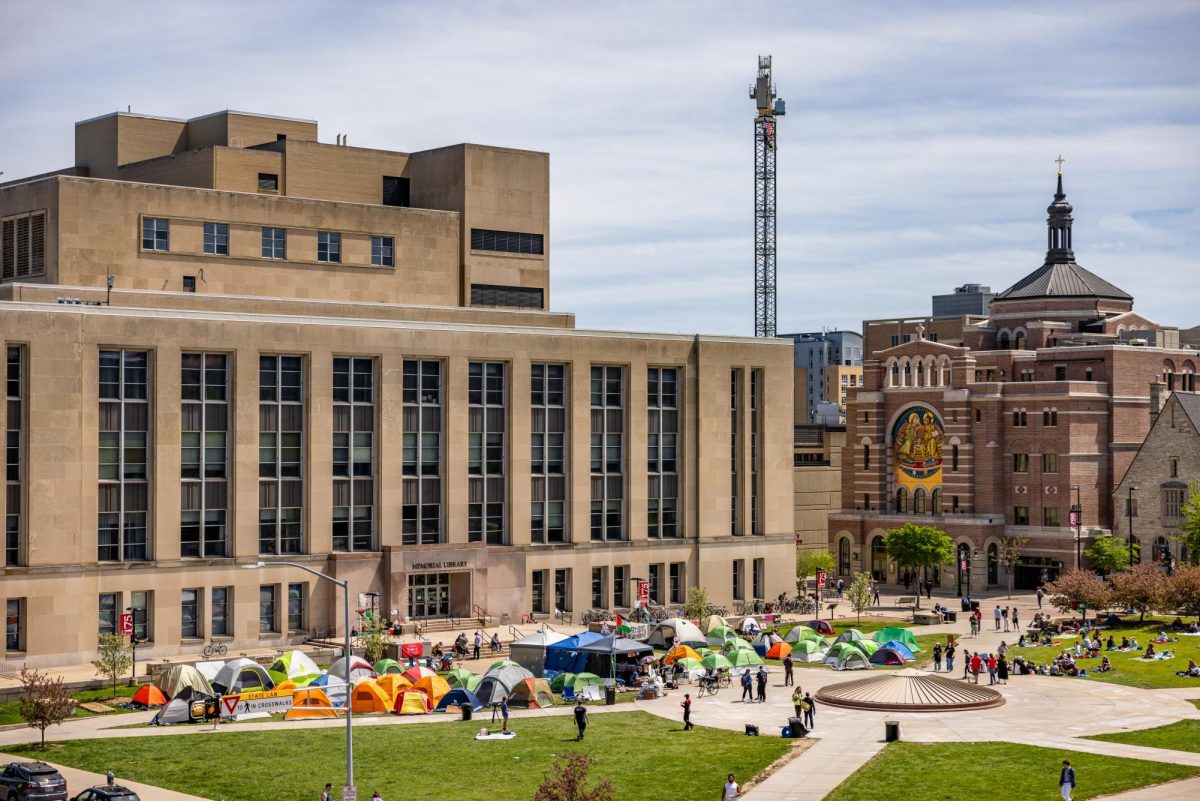Editor’s note: This report contains descriptions that readers may find disturbing.
Abby Panozzo said the day she was raped began in what seemed like safe surroundings — a block party with her teammates from the University of Wisconsin-Madison women’s lacrosse team.
Panozzo’s teammates had vouched for the guy, an out-of-town visitor who was hitting on her.
When she brought him a glass of water, he was very drunk, and she had had four or five drinks over the past few hours. She was willing to kiss him. But she told him that was as far as she would go, she said.
Then, according to Panozzo, he trapped her in that bedroom for three hours. He pushed her down, pulled off her clothes, and blocked her exit, while she told him no and repeatedly struggled to leave. Eventually she gave up, and asked him at least to put on a condom. Then, Panozzo says, he raped her.
She went to Meriter Hospital after realizing she was bleeding.
“He kept holding me down and pulling my hair,” a sexual assault report filled out by a forensic nurse quotes Panozzo as saying on that night in April 2006.
During the rape exam, as Panozzo cried out in pain, the nurse explained she was bleeding internally and her cervix was swollen.
“And through this whole pelvic exam ordeal was when I yelled that I wanted to press charges,” Panozzo recalled in an interview.
“Because it wasn’t fair.”
But ultimately, authorities never filed charges against the man.
Despite two decades of efforts to strengthen prevention and prosecution, sexual assaults remain seriously underreported and many victims still face barriers to notifying authorities at the University of Wisconsin System’s campuses, the Wisconsin Center for Investigative Journalism has found.
A review of records, and interviews with victims, advocates and administrators at the University of Wisconsin System’s 13 four-year campuses show:
The estimated number of rapes outnumbers reports of sexual assaults on UW System campuses and at the flagship UW-Madison by a margin of 17-1. With reporting levels so low, nearly all rapists go unpunished, whether by schools or the criminal justice system.
Victims still face barriers to reporting their assaults, including a fear that the experience will leave them feeling victimized again.
Wisconsin takes the relatively unusual step of requiring the university system to file an annual report on sexual assaults with the Legislature. Copies of the report, though discussed at public Board of Regents meetings and sent to the Legislature, were not readily available to the public in recent years. The Wisconsin Center for Investigative Journalism obtained reports through a public records request. But on Tuesday, in response to the Center’s reporting, UW officials acknowledged the reports should be more accessible, so they posted them on a new web page.
Recent changes in the University of Wisconsin System’s procedures for addressing sexual assaults are controversial. Some experts say it may become easier to punish rapists, while others worry that one change could intimidate victims. Because few rapists ever are formally accused, it is hard to determine the impacts of the revisions.
Campuses have ramped up prevention programs. However, their effectiveness is unclear and on some campuses, funding relies upon unstable grants.
Similar problems regarding sexual assaults at campuses across the nation are detailed in a year-long project led by the Center for Public Integrity, a nonprofit investigative journalism organization based in Washington, D.C. The latest stories, released last week, said students responsible for rapes rarely are held accountable while their victims’ lives are disrupted, federal watchdog efforts are weak and school administrators nationwide often are slow to realize they have serial rapists in their midst.
The Wisconsin Center for Investigative Journalism collaborated on this project with the Center of Public Integrity and investigative journalism centers in Colorado, Washington state, Texas and Massachusetts.
‘Sexual assault is literally epidemic’
How many rapes or attempted rapes are occurring on Wisconsin campuses?
National surveys of college women are the most accurate way to estimate campus rape, researchers say. An oft-cited federal National Institute of Justice study in 2000 estimated 35 rapes per 1,000 students each academic year.
For the UW System, with about 94,700 female students in 2008, that translates to about 3,300 rapes per school year. And that’s not including male victims; a 2003 U.S. Department of Justice study estimated that 1 in 10 rape victims was male.
The System’s most detailed report lists 188 sexual assaults in 2008 — and that’s including all rapes or attempted rapes, plus less severe forms of sexual assault, such as sexual contact without consent.
At a school the size of UW-Madison, with about 21,600 women in 2008, national statistics suggest there could be 750 rapes or attempted rapes a year.
The school’s most detailed report shows 44 sexual assaults in 2008.
Most were off-campus and involved acquaintances, not strangers.
Experts interviewed by the Center said there is no reason to believe sexual assaults in Wisconsin are lower than the figures cited by national surveys. In fact, the UW System’s annual report to the Legislature cites those estimates.
“These numbers here don’t even begin to touch on the reality of the situation,” said Rep. Joe Parisi, D-Madison, who chairs a key Assembly committee that oversees sexual assault legislation.
“Sexual assault is literally epidemic in our society, and especially among younger women.”
Blame the victim?
Research suggests rapes are no more likely to be falsely reported than any other crime. Yet advocates say a cultural double standard creates a powerful barrier to reporting.
“They see victims get annihilated for speaking, they get slandered, they’re the butts of jokes. The frenzy of victim-blaming,” said rape activist Laura Dunn, who has publicly accused two former UW-Madison athletes of sexually assaulting her while she was a freshman in 2004. “They see that going forward means you’ve got to be ready for that.”
Police investigated her case, and the district attorney declined to file charges. The school declined to file disciplinary charges against the men. Dunn unsuccessfully filed a claim against the school with the U.S. Department of Education’s Office of Civil Rights.
Research shows most women whose experiences with men they know meet the legal definition of rape or attempted rape — unwanted penetration using force or the threat of it — don’t label it that.
In this climate, reporting sometimes becomes an act of activism: Dunn and Panozzo said they came forward to stand in for the hundreds of women who couldn’t bear to do so.
“What I wanted to get out of it was, I had heard time and time again, people don’t report,” Panozzo said. “I don’t want to contribute more to people not reporting. Because then it’s never going to change.”
In 2007, Panozzo was informed by police that she could pick up her dirty clothes. As she walked away, she tossed them in the police department’s dumpster. She said she only learned this year, from a reporter, that her case was officially closed.
Mike Domitrz, a UW-Whitewater graduate and motivational speaker who travels the country to deliver sexual assault prevention workshops to high school and college students, lauded the devotion of UW officials around the state. But, he added, “the majority of them will tell you what we’re seeing right now, we still have a big corner to turn here” before the problem is controlled.
Rape researcher David Lisak at the University of Massachusetts said funding for prevention is a weakness of university efforts nationwide.
“This has got to be a permanent part of the community,” he said. “This is not something where you get a three-year grant and fix the problem.”
Serious punishments are rare
Students on UW campuses and others across the nation are rarely suspended or expelled for sexual assaults. At UW-Madison, four students have been suspended over the past six years for sexual assault. Officials at UW-Green Bay were not aware of any suspensions or expulsions for sexual assault in the history of their institutions. UW-Madison Associate Dean of Students Kevin Helmkamp said it is more common for a university to take lesser actions, such as probation.
Few victims want to pursue disciplinary action against the rapist, administrators say. A major challenge is that victims don’t want to relive the experience, UW-River Falls Associate Vice Chancellor for Student Affairs Gregg Heinselman said.
The Legislature could do more, said Parisi, the Madison legislator, but is not wholly responsible. Society’s attitudes are to blame.
“First, we have to realize there’s a crisis, and we have to pay attention to it,” he said. “It’s not just with a committee hearing in the Legislature.”
The nonprofit Wisconsin Center for Investigative Journalism (www.WisconsinWatch.org) collaborates with its partners — Wisconsin Public Radio, Wisconsin Public Television and the UW-Madison School of Journalism & Mass Communication — and other media. This project on campus sexual assaults was supported by a grant from the McCormick Foundation.

















